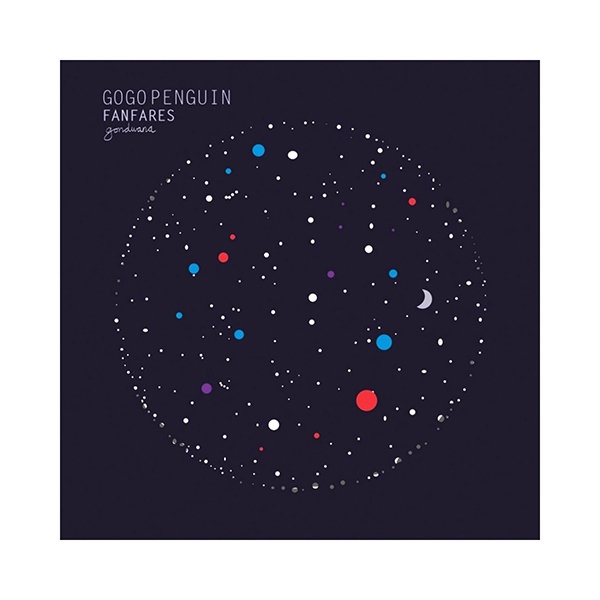
by Ian Mann
December 16, 2012
/ ALBUM
A remarkably interactive trio with each member playing a key role."Fanfares" exhibits enormous promise. There are some strong tunes here and the playing is assured and confident throughout.
GoGo Penguin
“Fanfares”
Gondwana Records GONDCD008)
GoGo Penguin are a young piano trio based in Manchester. Despite their frankly rather silly group name they’ve generated a lot of attention for their exciting live performances and their début album appears on the fashionable Gondwana label run by their fellow Mancunian, trumpeter and DJ Matthew Halsall.
Chris Illingworth (piano), Grant Russell (bass) and Rob Turner (drums) all studied at the Royal Northern College of Music (RNCM) in Manchester. After playing together on other projects they began to work together, creating new compositions by jamming around on ideas the individual members had brought in. Listening to the album it’s immediately apparent that E.S.T. have been a huge influence on the band but the trio also cite classical composers Debussy and Shostakovich in addition to more contemporary artists ranging through Brian Eno, Massive Attack, Radiohead, Aphex Twin, Fourtet and many others including several from the jazz field.
In its early days the trio used to perform covers of E.S.T. tunes and the album opens with Illingworth’s “Seven Sons Of Bjorn”, a tribute to Esbjorn Svensson written shortly after the Swedish pianist’s tragic death in a diving accident in 2008. Russell’s electronically enhanced arco bass and Turner’s driving drumming immediately locate the music in E.S.T. territory with Illingworth’s varyingly percussive and flowing piano taking Svensson’s role. Yes, it’s unashamedly derivative but it’s no less enjoyable for that and also represents a powerful piece of writing.
Turner’s drumming is inspired as much by the beats of electronic music as jazz. His “Last Words” derives its inspiration from the music of Aphex Twin. Like Richard Spaven, drummer with pianist Robert Mitchell’s trio, Turner is fully versed in the broken beats of hip hop and deploys his expertise here in a piece with a a shuffling, urban groove that also deploys electronically enhanced bass but is a substantial departure from the E.S.T. model.
The pure acoustic sound of Russell’s double bass introduces his “Unconditional”, a piece originally inspired by the harmonic ideas of Kenny Wheeler and Miles Davis and the melodic sense of Chopin. Originally conceived as a piano ballad the co-operative trio arrangement, particularly the delicate urgency of Turner’s drumming, adds an agreeably contemporary twist to this simple, highly melodic and very lovely tune.
Illingworth’s title track grew out of the pianist’s improvisations around the etudes of Gyorgy Ligeti and the little known Finnish classical composer Einojuhani Rautavaara. Forceful full on driving passages are punctuated by quirkier, classically inspired, but still highly energetic, interludes, including features for bass and drums. It’s a fascinating mix of classical and contemporary influences infused with an infectious youthful energy.
Although Russell’s bass represents the trio’s main electronic component Turner and Illingworth are also beginning to experiment with electronics. Turner’s “I Am That” features a mix of prepared and acoustic drum sounds with the composer often at the heart of the music. Again contemporary and classical influences are juxtaposed in a fascinating piece that occasionally dips into the E.S.T. legacy.
“Akasthesia” begins with a lengthy passage of solo bass inspired by three giants of the instrument, Jaco Pastorius, Miroslav Vitous and Anders Jormin. It’s a highly impressive intro that develops into a broodingly lyrical tune with Russell continuing to feature prominently alongside Illingworth’s piano chording and Turner’s gently shuffling grooves.
The closing “HF” develops from an opening piano motif written by Turner and developed by Illingworth. The lyrical beginnings give way to a more forceful central section with Russell’s electronically enhanced arco bass taking flight above the pounding rhythms of Illingworth and Turner. The piece exhibits something of the urgency of the Neil Cowley Trio in full on mode.
“Fanfares” exhibits enormous promise. For sure it’s a little derivative and the group still amounts to the sum of its influences but there are some strong tunes here and the playing is assured and confident throughout. With their use of beats and rhythms inspired by electronic music the trio are really onto something and drummer Turner is arguably the group’s most distinctive instrumentalist.
GoGo Penguin is a remarkably interactive trio with each member playing a key role, there’s virtually no conventional jazz soloing and the trio is so much more than just “piano plus rhythm section”. “Fanfares” has already created quite a buzz and I predict that in jazz terms it will do very well. However it’s likely that the trio’s best work is yet to come as they continue to develop an increasingly individual group style.
Meanwhile GoGo Penguin are already building something of a cross generational following and have played in venues ranging from churches to a “club full of 400 drunk 19 year olds and they seemed to like it”.
Successful jazz festival appearances have included Gateshead and Manchester and the trio’s management no doubt harbours the hopes that GoGo Penguin may achieve the kind of breakthrough achieved by their cross Pennine neighbours the similarly youthful Roller Trio from Leeds. The latter’s startling rise to national prominence stemmed from a Mercury Music prize nomination and one wouldn’t be at all surprised to see GoGo Penguin following a similar path in 2013.